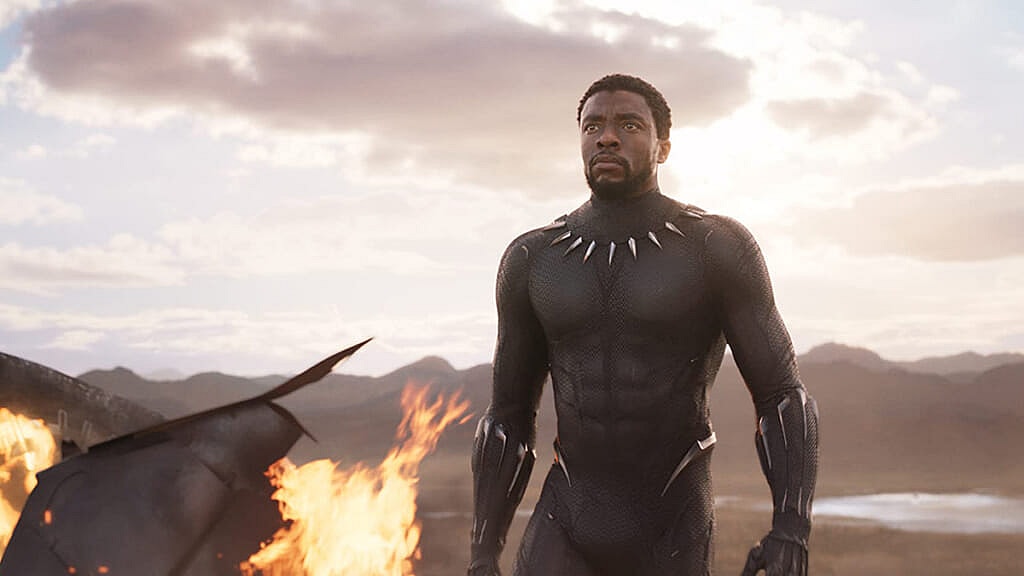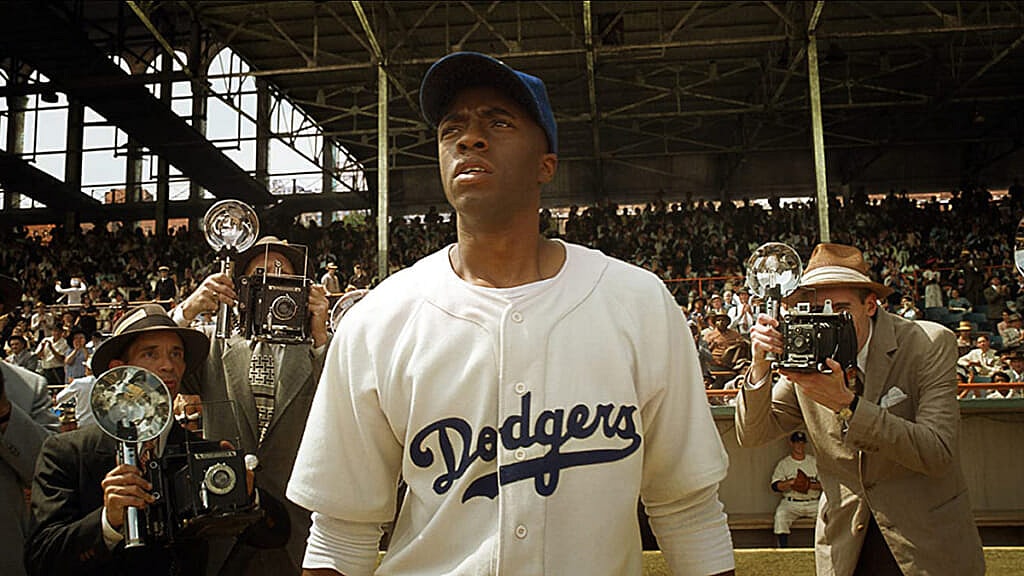Chadwick Boseman passed away at the age of 43 on Friday after fighting colon cancer for four years.
With his unexpected death, the world got the sobering reminder that the man who played the superhero T’Challa in the 2018 blockbuster film Black Panther was, in fact, a human being.
His portrayal of the Marvel character galvanized millions of Black Americans who loved seeing themselves on the big screen depicted as a stately symbol of morality, intelligence, agility and wisdom.
The same way that Superman put on a cape when it was time for him to jump into action, Boseman’s four installments of playing Black Panther in the Marvel Cinematic Universe moved us to adorn ourselves in the cloths of our African brethren and ancestors and assemble in droves at theaters all over the nation. It wasn’t just an outward showing of solidarity, but of hope that the dignity and pride that sometimes eludes us would seep into our pores.

As Black Panther, Boseman helped reveal to Black America a fantastical, but attainable vision of what a community and civilization, unburdened by White supremacy, looks like. Wakanda, the fictional sub-Saharan African country where Black Panther would rise to be king, prospered with advanced technology and the absence of poverty and patriarchy.
“Colonization and slavery enslaves everybody; it doesn’t just enslave the African. It enslaves — everybody is bound by the limitations of those systems,” Boseman said in a 2018 interview on ABC’s The View. “Because [the people of Wakanda] are not up under that, they’re OK with an idea of seeing male and female on the same level. Like, my sister can challenge for the throne.”
However, if you look at the roles that Chadwick chose for himself over the last eight years of his life, you’ll see that Black Panther wasn’t the only Black hero he portrayed.
Jackie Robinson. James Brown. Thurgood Marshall. Boseman was a one-man Justice League unto himself.
READ MORE: Celebrities react to the tragic death of Chadwick Boseman
Unlike T’Challa, these three men did not have access to the limitless element of vibranium or a bulletproof suit. But they had far more in common with the King of Wakanda or other comic book heroes than some may realize.
As Boseman dramatized in his breakout performance in the sports biopic, 42, Jackie Robinson achieved his legend status by showcasing his individual prowess on the baseball field in the midst of visceral, inescapable hatred and nonacceptance of a country divided by segregation. His stoic demeanor and unflappable spirit was a precursor to the non-violent ideology that helped folks like Martin Luther King, Jr. thrive.
In Get On Up, Boseman played Brown as a man who endured the pitfalls of being a product of his environment, internalized that suffering and repurposed it into ambition, innovation and ownership. He was also able to recreate Brown’s rapid dance movements that paralleled the razor sharp dexterity and speed, as well as embracing the pride of his unfiltered masculinity.
Long before his history-changing moments successfully overturning legalized segregation in the Brown vs. Board of Education Supreme Court case and later becoming the first Black Justice on that same court, Thurgood Marshall embodied the classic Black American burden: having the weight of an entire race on your back and knowing your performance can fulfill or seal the fate of this massive tribe. In a 2017 appearance on The View, Boseman called the film Marshall a “superhero origin story.”

Boseman, a Howard University alumnus, was quite methodical in his decision making when it came to choosing these roles. He understood how the Black American experience could help him mine inner creativity that would be an inspiration to play and inspirational to watch.
“I would say probably [there] always was a different thing I was looking for because of that prior experience,” Boseman said in a 2017 interview on The Off Camera Show. “The manifesto that you’re sort of given at Howard to tell stories that, you know, sort of highlight the African, the African-American experience. I think you relish those opportunities.”
He took the responsibility of being that beacon for so many on the big screen.
In a world when so many of the portrayals of us are negative tropes of toxic sexuality, dishonestly, and thirst for strife, Boseman dared and succeeded on showing the world the best of the Black diaspora.

READ MORE: Chadwick Boseman got emotional about young fans who died of cancer in 2018 interview
Not our potential greatness, mind you. It’s important NOT to say that his roles showed what was possible for Blackness. His roles illuminated our kinetic, tangibly proven power.
“We live in a society where the arts have affected how we view the world. We’ve gone through periods of time where stereotypical versions of the Black experience have negatively affected how people view their surroundings and view people,” he continued. “There’s way more information there than there is in a stereotype, which is hollow.”
The fact that Boseman played Marshall and T’Challa along with several other films during his four-year bout with colon cancer is remarkable.
But it goes deeper than that.
To personify these men on-screen takes an immeasurable amount of physicality, mental preparation and spiritual openness if you’re going to do it convincingly.
So for him to do so, all while quietly enduring treatment, takes an amount of personal and professional fortitude that can only be described as superhuman.

In a 2017 Huffington Post interview about the process of preparing his body to go back and forth between portrayals of Marshall and Black Panther, he cryptically explained how cancer had been taken its toll on him.
When asked if he had been through the “wringer” by having to “bulk up, slim down and then bulk up again” after rotating between his roles of T’Challa and Marshall, Boseman quipped: “Oh, you don’t even know.”
“You have no idea. One day I’ll live to tell the story,” the told the online publication.
Boseman did the work. Now it’s up to us to tell that story.
Chadwick Boseman was a pillar of Black excellence on screen. These roles were a daily reminder of the full range of African-American innovation, leadership and tenacity.
Because of that, he made himself a symbol. He made himself an icon. He made himself immortal.
See you in the Ancestral Plane.
Have you subscribed to theGrio’s podcast “Dear Culture”? Download our newest episodes now!


